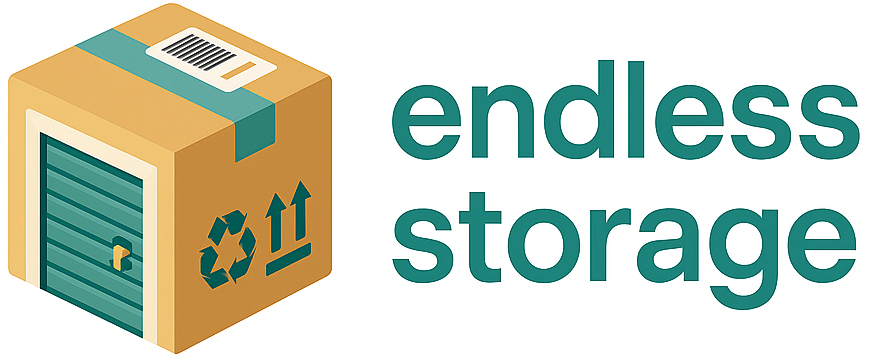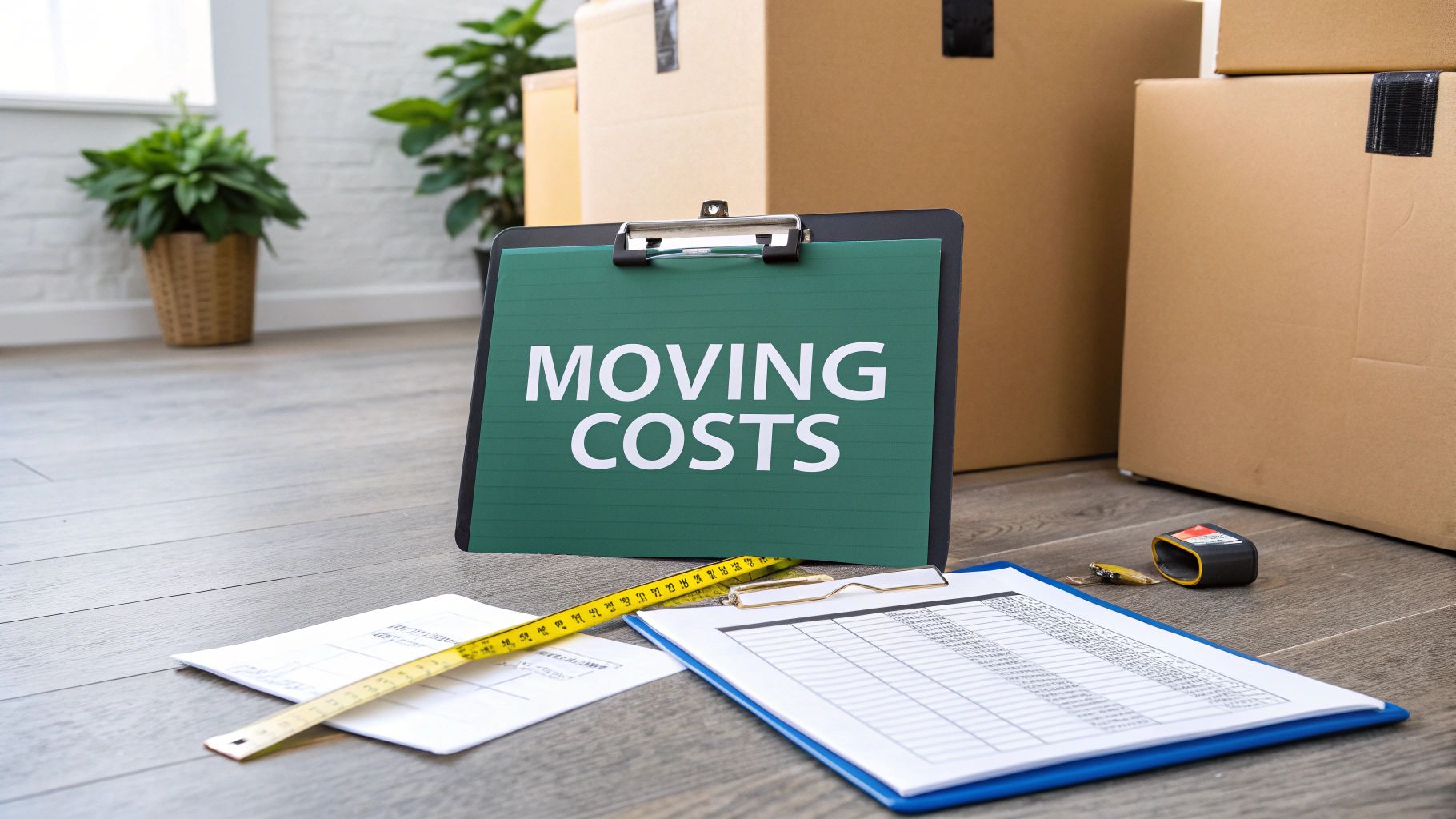So, you're trying to figure out how much this move is actually going to cost. It's the big question, right?
Generally speaking, you can expect to pay anywhere from $480 to $2,880 for a local move. If you're heading further out, a long-distance move can run between $1,500 and $6,885. Of course, these are just ballpark figures—the final bill really comes down to the size of your home, how far you're going, and any extra services you need.
What Is the Real Cost of a Stress-Free Move?
Hiring professional movers is about more than just getting your stuff from Point A to Point B. Think of it as an investment in your sanity. It's the difference between a chaotic, stressful day and a smooth, efficient transition.
The real cost isn't just the final number on the invoice. It's the peace of mind you get from knowing your belongings are in the hands of experts with the right equipment. It's the time you save—time you can spend on a million other things instead of hauling boxes.
This infographic breaks down the key things that will shape your final quote: the size of your home, the distance of the move, and even the time of year you choose to do it.
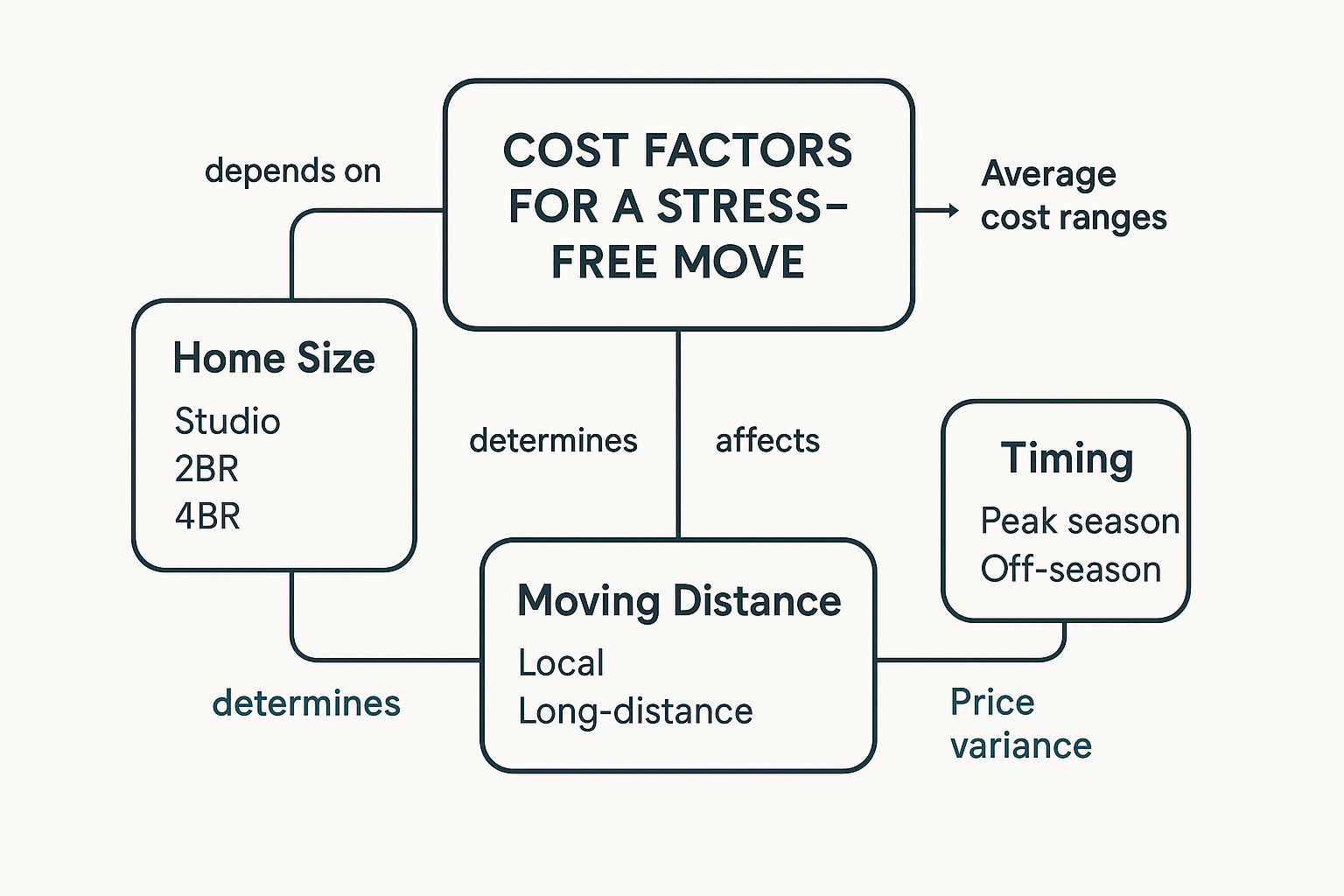
As you can see, a bigger home or a cross-country trip will naturally cost more. But here's a pro tip: moving during the off-season can often lead to some pretty significant savings.
Understanding Average Moving Prices
To really nail down your budget, it helps to look at some industry benchmarks. Here’s a quick overview of what you can expect based on home size for both local and long-distance moves.
Average Moving Costs at a Glance
These numbers give you a solid starting point. Keep in mind, things like packing services, specialty items (like a piano), and insurance will also factor into your final quote.
For a truly smooth experience, you have to think beyond just the movers. Tackling other logistics, like selling your house quickly when moving out of state, can make a world of difference. When all these pieces come together with a clear budget, you're setting yourself up for success.
Want to get even more specific with your numbers? Check out our complete guide on how to estimate moving costs for a deeper dive.
Breaking Down Your Moving Quote
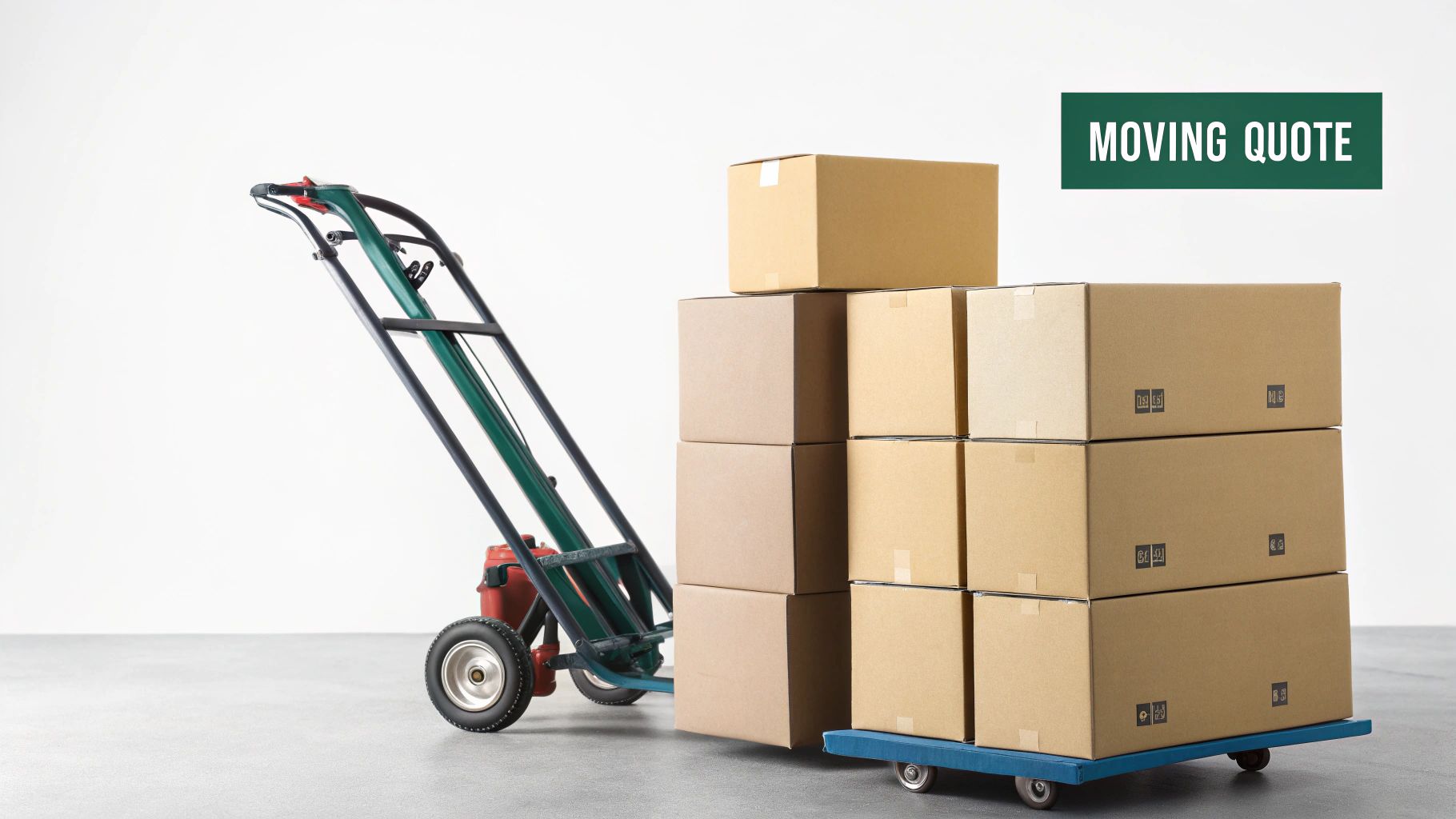
It’s easy to look at a moving quote as just one big, intimidating number. But that final price isn’t pulled out of thin air. Think of it more like a final bill at a restaurant—it's a calculated total made up of several individual items. The cost of professional movers is a combination of a few key factors that all contribute to the final tally.
Once you know what those factors are, you can see exactly where your money is going. This gives you the power to find areas where you can make smarter choices and potentially bring that final number down. Let's pull back the curtain on the three main ingredients that go into almost every moving estimate.
The Distance Factor: Your Journey's Price Tag
First up, the most obvious one: how far are you going? Whether you’re moving across the street or across the country is the biggest initial fork in the road, determining whether you’re having a "local" or "long-distance" move. This single detail completely changes how companies price your job.
Local Moves (Usually under 100 miles): These are almost always billed by the hour. The timer starts when the crew shows up and stops after they’ve set down the last box in your new place. The hourly rate is based on how many movers and trucks your job requires.
Long-Distance Moves (Interstate): For the big treks, movers scrap the hourly model. Instead, your price is mainly based on the total weight of your belongings and the mileage of the journey. This gives you a much more predictable, fixed cost for the long haul.
It's a bit like the difference between a taxi ride across town where the meter is running versus buying a plane ticket where the price is set for your specific destination.
The Weight and Volume: The Bulk of the Cost
Right after distance, the biggest influence on your bill is simply how much stuff you have. For long-distance moves, this is a literal calculation: your shipment is weighed, and you pay by the pound. The heavier your belongings, the more fuel the truck burns and the more labor is involved.
For local, hourly moves, it’s more about volume—how much space your items take up in the truck. A small one-bedroom apartment might be a quick job with a smaller truck. But a four-bedroom house is going to need a bigger truck and a lot more hours on the clock for the crew to get it all loaded and unloaded.
Key Takeaway: Getting rid of clutter before you move isn't just about starting fresh. It's one of the best ways to save money. Every single item you sell, donate, or toss out before the movers arrive is one less thing they have to lift and transport, which directly chips away at your final bill.
The Timing Factor: When You Move Matters
Finally, a factor that catches many people by surprise: the calendar. The moving industry has very clear busy seasons and slow seasons, all driven by classic supply and demand. Trying to book a move on a weekend in the middle of July is like trying to find a cheap flight five days before Christmas—you're going to pay a premium.
Peak Season: Things get hectic from May through September. The absolute busiest months are June, July, and August. Weekends and the very end of the month are also prime time, regardless of the season.
Off-Season: If you can swing it, moving between October and April can save you a good chunk of change. Mid-week and mid-month dates are especially quiet, and companies are often more competitive with their pricing.
If your schedule has any wiggle room, use it. Shifting your move to an off-peak day is a simple move that gives you more bargaining power and access to better rates. To get a sense of how different companies compare, check out our in-depth moving company cost comparison for finding the best value.
Navigating Add-Ons and Potential Hidden Fees
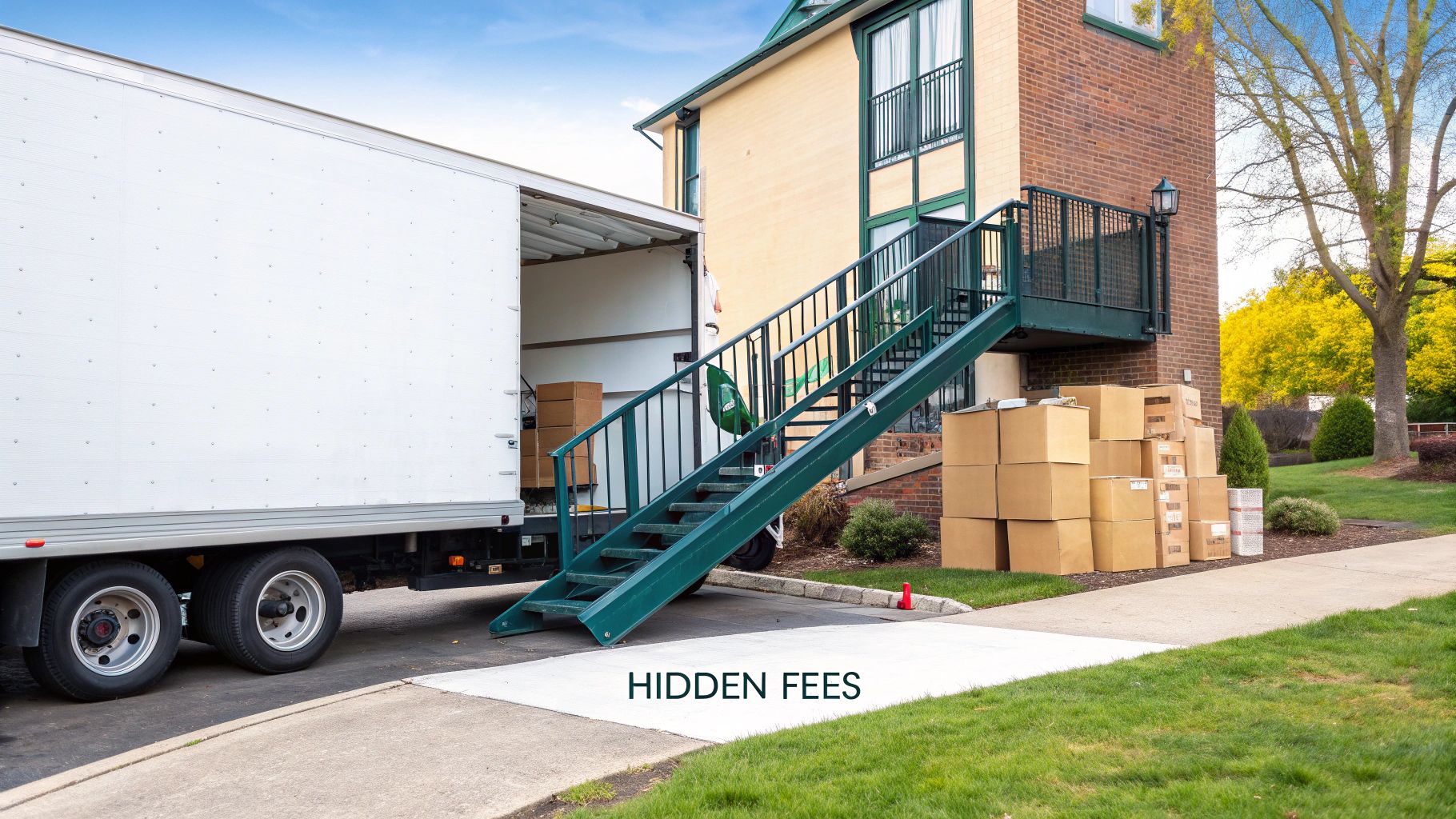
The first quote you get from a moving company is just the starting line, not the finish. Think of it like the base price for a new car; it’s the optional features and upgrades that really shape the final cost. When you're figuring out the cost of professional movers, you'll quickly find a whole menu of services and situational fees that can easily inflate that initial number.
These "add-ons" aren't always a bad thing. In fact, many of them offer genuine convenience and much-needed protection for your stuff. The real problem comes from being caught off guard. Knowing what these extras are ahead of time lets you decide what's worth paying for and helps you dodge any nasty surprises when the final bill arrives.
Common Add-On Services
Most movers offer a lot more than just lifting boxes and loading the truck. These are the "a la carte" options you can tack on to make your life easier—for a price, of course.
You'll likely come across these common add-ons:
- Full-Service Packing: Don't have the time or the will to pack up your entire home? The movers will gladly handle it. Just know this white-glove service comes at a premium, usually billed by the hour or per box.
- Packing Materials: While you can always hunt down your own supplies, movers will sell you all the boxes, tape, and bubble wrap you need. Expect to pay a bit more for the convenience.
- Specialty Item Crating: Got a giant mirror, a marble tabletop, or a valuable piece of art? A custom-built wooden crate is the best way to protect it, and movers will build one for you.
- Short-Term Storage: If your move-out and move-in dates don't line up perfectly, many companies offer storage-in-transit (SIT). They'll hold your belongings for you and bill you daily or monthly.
Potential "Surprise" Fees To Anticipate
Beyond the services you choose, the logistics of your home can trigger extra charges. These fees aren't always intentionally "hidden," but they’re often tucked away in the fine print of the contract.
Pro Tip: Before you sign anything, always ask your moving consultant for a complete list of potential accessorial charges. A reputable company will be upfront about these costs.
Here are a few common situational fees to keep on your radar:
- Stair or Elevator Fees: Hauling furniture up and down multiple flights of stairs or dealing with an elevator takes more time and muscle. Movers often charge a flat fee per flight or an hourly surcharge for this.
- Long Carry Fees: If the truck can't park close to your front door (usually within 75-100 feet), you'll get hit with a long carry fee. It covers the extra labor of trekking all your belongings a greater distance.
- Shuttle Service Fees: Is your new home on a narrow street that a massive moving truck can't access? The crew will have to transfer everything to a smaller "shuttle" truck for the final leg of the journey, which comes with a hefty fee.
Getting a handle on these charges is key to building a realistic budget. If you need more info on protecting your items, our guide on self-storage insurance costs is a great resource. Understanding every potential charge is crucial; for a different perspective on service pricing, check out a comprehensive guide to various service fees to see how other industries approach it.
To help you get a clearer picture, here’s a quick rundown of some common add-ons and what they might cost you.
Common Moving Add-Ons and Potential Fees
This table breaks down some optional services and potential extra charges that can pop up, helping you create a much more accurate moving budget.
Keep in mind that these costs are just estimates. The best way to avoid surprises is to talk through every detail of your move with the company and get all potential fees listed in writing before you sign on the dotted line.
Understanding the Pressures Driving Moving Prices
If you've gotten a moving quote recently and the number made you do a double-take, you're not alone. The price tag on a professional move isn't just pulled out of a hat—it’s a direct reflection of some serious economic pressures squeezing the moving industry right now. Getting a peek behind the curtain helps make sense of the cost of professional movers.
Just think of a moving company like any other business. To stay afloat, their prices have to cover their own ever-increasing expenses. When things like fuel, trucks, insurance, and labor get more expensive for them, that cost naturally finds its way to you, the customer.
The Soaring Cost of Doing Business
Over the last few years, the entire logistics world has been hit by a perfect storm of inflation. Every single thing a moving company needs to operate—from the truck itself to the insurance policy that protects it—has gotten more expensive. We’re not talking about a minor price bump here; it's a major shift in the fundamental cost of providing a safe and reliable service.
The global moving and storage industry has been slammed with historic cost increases across the board. Between 2020 and 2025, the cost of essentials like trailers, insurance, labor, and fuel has absolutely skyrocketed. In some cases, total cost inflation has shot up by as much as 80% in that five-year window.
These aren't small, gradual changes. They represent a new economic reality for the moving business.
A professional moving quote today is a fair exchange for a service that requires immense resources. It covers not just the crew's time, but also the high-value equipment, extensive insurance, and skilled labor needed for a secure move.
What This Means for Your Quote
So, how do these big-picture economic trends trickle down to your personal moving budget? Simple. The quote you receive is a price that has to account for these realities. A reputable moving company isn't just charging you for a few hours of heavy lifting. They're pricing in the full cost of running a safe, legal, and efficient operation in a very tough market.
Here are the main operational costs that are baked directly into your bill:
- Fuel Prices: Volatile gas and diesel prices are a huge variable, especially for any long-distance move.
- Commercial Vehicles: The price of new trucks and trailers has surged, and so has the cost of keeping them maintained.
- Labor Wages: In a competitive job market, paying higher wages is the only way to attract and keep skilled, trustworthy crews.
- Insurance Premiums: The cost to insure the truck, the cargo, and the business against liability has climbed steeply. This is what protects both the company and your belongings.
Knowing this helps reframe the cost. It’s less of an expense and more of an investment in a dependable, worry-free move. Of course, timing your move strategically can also help take some of the sting out of these costs. You can learn more in our guide to the best time to move.
Corporate Relocation: The Business of Moving
So far, we’ve been looking at moving costs from a personal angle. But to really get the full picture, it helps to step back and see the industry through a different lens: the world of corporate relocation.
When a company needs to move a key employee, they aren’t just booking a truck. They're making a serious strategic investment in keeping their talent mobile and productive.
For a business, a smooth transition is everything. The goal is to get their employee settled and back to work as quickly as possible. This means they often fund comprehensive relocation packages that cover much more than just the heavy lifting. Think full-service packing, temporary furnished housing, shipping a vehicle, and even help with selling the employee's old home.
The Scale of Corporate Moving
The way companies handle moves says a lot about the trust and financial weight they place in professional movers. When business continuity and employee morale are on the line, cutting corners isn’t an option.
They partner with moving services that can handle complex logistics with precision. This professional partnership ensures a company’s most valuable asset—their employee—arrives ready to contribute, not completely wiped out from a stressful move.
This isn't some niche market, either. It's huge, and it's growing, which tells you just how vital moving is to the economy at large. The global corporate relocation market is valued at a whopping $20.22 billion and is expected to climb to $32.47 billion by 2032. This growth really highlights the demand for high-quality, structured relocation services. You can dig deeper into commercial moving trends and what the latest data says to learn more.
This corporate perspective drives home a key point: professional moving is a critical service that props up economic activity. It’s not just about getting furniture from point A to point B; it’s about enabling growth, talent acquisition, and operational success for businesses of all sizes.
By seeing how businesses budget for and approach moving, it becomes much clearer why professional movers charge what they do. The price reflects a service built on expertise, logistics, and, most importantly, trust.
Actionable Strategies to Lower Your Moving Bill

Alright, you now understand what makes the cost of professional movers tick. So, how do you take back control of the final bill? With a few smart, strategic choices, you can slash your moving costs without having to sacrifice a smooth, professional experience. It really boils down to being proactive about the two biggest cost factors: time and weight.
The single most effective thing you can do starts weeks—or even months—before the truck shows up: declutter relentlessly. Every single item you sell, donate, or toss is one less thing for movers to handle. This directly cuts down on billable hours for a local move or shaves pounds off a long-distance one, saving you money right from the get-go.
Timing Is Everything
As we touched on, timing your move can make a huge difference. If you have any wiggle room in your schedule, aim for the off-season, which generally runs from September through May. Demand for movers takes a nosedive during these months, and companies are often more willing to offer competitive pricing to keep their crews working.
Even if you’re stuck moving during the summer rush, you can still find pockets of savings:
- Book Mid-Week: Try to schedule your move for a Tuesday or Wednesday. Weekends are always the most popular (and most expensive) days.
- Avoid the End of the Month: The first and last few days of the month are a whirlwind of activity as leases end and new ones begin. Booking smack in the middle of the month often means better rates and more open slots.
A binding quote is your best friend when budgeting. It’s a guaranteed, locked-in price based on the inventory you provide. This prevents any surprise charges on moving day, giving you complete cost certainty as long as you don't add more items to the move.
Get Smart with Packing and Supplies
Sure, full-service packing is a dream, but it's also a major line item on your invoice. A hybrid approach can save you a bundle. Consider packing the easy, non-fragile stuff yourself—think books, clothes, and linens. Leave the tricky items like dishes, artwork, and electronics to the pros who have the right skills and materials.
You can also hunt down packing supplies for free. Before you spend a dime, check out local community forums, liquor stores, and grocery stores. They almost always have sturdy boxes they’re happy to get rid of. This one step can easily save you hundreds of dollars.
And don’t forget to look for bundled deals. For example, some facilities offer a free moving truck with a storage rental, which can be a fantastic value if you need both services.
Finally, and this is a big one: never, ever go with the first quote you get. It’s standard practice to get at least three detailed, written estimates from reputable moving companies. This lets you compare not just the final price, but also what’s included, the insurance coverage, and any hidden fees. Doing your homework here is the best way to ensure you're getting true value for your money.
A Few More Questions About Moving Costs
Even after you've compared quotes and mapped out your budget, there are always a few lingering questions. It's totally normal. Getting these last few details ironed out is what gives you the confidence to know you're truly ready for moving day.
Think of this as your final check-in. We're going to tackle the common questions that pop up right before the big day, making sure there are no surprises left.
Is It Cheaper to Move on a Weekday?
Yes, it almost always is. Weekends are prime time for moving, which means demand is high and so are the prices.
If you have some wiggle room in your schedule, booking your move between Monday and Thursday can save you a decent amount of money. You'll likely find lower hourly rates and have an easier time booking a slot with a top-rated company.
What Is the Difference Between a Binding and Non-Binding Estimate?
This one is really important for your budget, so let's break it down. Understanding the type of quote you have is key to avoiding any unexpected costs.
- Binding Estimate: This is a fixed price. The quote you get is the price you pay, period—as long as you don't add more items to the move or ask for extra services last minute.
- Non-Binding Estimate: This is more like a ballpark figure. It’s based on the estimated weight of your stuff or the number of hours the crew expects to work. Your final bill could end up being more (or less) than the initial quote.
A binding estimate gives you complete peace of mind. If you're on a tight budget, this is the way to go. It takes all the guesswork out of the final bill.
Do I Need to Tip My Movers?
While it’s certainly not mandatory, tipping is a common and much-appreciated gesture to thank your crew for their hard work. Think about it—they’ve been lifting heavy furniture all day.
A good rule of thumb is 15-20% of the total moving bill, which you can ask the foreman to divide among the crew. Another popular option is to give a flat amount, like $20-$50 per mover, especially if the job was particularly tough.
Does Disassembling Furniture Add to the Cost?
Sometimes, yes. Most movers will include basic disassembly and reassembly in their standard rate, like taking the legs off a dining room table or removing a headboard.
However, for more complex pieces—think bunk beds, massive entertainment centers, or that home gym equipment—they’ll likely charge an additional fee. It's always best to bring this up with your moving coordinator when you're getting your quote so it’s factored in from the start.
Ready to make your next move simple and stress-free? Endless Storage offers by-the-box storage solutions with free pickups and deliveries, helping you declutter before your move and store items with ease. Learn more about our convenient storage options!
Frequently Asked Questions
Unveiling the Secrets to Effortless Storage
Endless Storage is available nationwide. You pick a plan, tell us where to pickup, and we'll send a UPS van to collect, whichever state you're in.
Your shipping label will be sent to your email within a few minutes, if not instantaneously. It can also be accessed through your customer profile.
Your box will be shipped to one of our climate controlled self storage facilities in our closest self storage facility. Our manager will accept your package, notify you that your box has been received, and securely stored. Only our managers will have access to Endless Storage boxes.
Email us at admin@endless-storage.com click to live chat with us, or send us a message below.
Never! We're committed to transparent pricing with no surprises. You'll lock in your rate with no hidden fees and no long-term contracts.
Fast access guaranteed! Your boxes will arrive at your doorstep within 48 hours of requesting them back. Need to check on delivery? We provide tracking information for complete peace of mind.
Totally flexible! Store month-to-month with no long-term commitment and cancel anytime.
Everything's online! Use your account dashboard to:
• Set up automatic monthly payments
• Request box returns
• Update your address
• Order additional boxes
• Track shipments
Your boxes are insured up to $100 each. Our customer service team will help you file any necessary claims and resolve issues quickly.
Don't worry – we'll email you right away if there's a payment issue. Your items stay safe, though you may have temporary service interruption or late fees until payment is resolved.
When you request our free storage kits, you'll have 30 days to send in your boxes to activate your 3 months of free storage. Think of it like starting a gym membership – your activation window begins when you receive your kits, and your full free trial begins once you send in your first box. During your free months, you'll experience our complete storage service at no cost.
Your 30-day activation window begins when you receive your storage kits. We'll send you an email confirmation when your kits are delivered, marking the start of your activation period.
If you haven't sent any boxes for storage within your 30-day activation window, your free trial will expire and we'll begin charging the regular monthly rate of $9.99 per box. This helps ensure our storage kits go to customers who are ready to use our service.
A box costs $9.99 per month to store (plus sales tax). This price includes free shipping for standard boxes under 50 lbs. and smaller than 16"x16"x16"
Log into your Endless Storage account, locate the box you would like returned, and simply click Return My Box.
Yes, each box stored with us is insured for up to $100 throughout transit as well as the duration of storage within our facilities.
Your box will be at your doorstep within 48 hours of you requesting it back.
Store 10+ boxes? We'll pick them up for free! After your purchase, we'll contact you to schedule a convenient pickup time and arrange UPS collection.
We trust UPS with all shipments, and every box includes $100 insurance coverage. You'll receive tracking information to monitor your items' journey.
Yes! Visit any of our locations by appointment. Just bring a photo ID matching your customer profile.
For everyone's safety, we can't store hazardous materials, firearms, or perishables. All items must fit within our standard boxes.
It's easy! Order your storage kit online, and we'll ship it to you within 1-2 business days. Your shipping labels will be emailed instantly and available in your account.
We're here to help! Email us at admin@endless-storage.com, use our live chat, or send us a message through your account.
To cancel your storage service with Endless Storage, please email your cancellation request to admin@endless-storage.com. Our team will process your request within 2 business days and confirm your cancellation via email.
We understand packing takes time. However, to maintain your free trial benefits, you'll need to send at least one box within the 30-day activation window. If you need more time, you can always start with one box to activate your trial and send the rest later. You can always reach out to admin@endless-storage.com if you have any issues or concerns.
When you request our free storage kits, you're starting a 30-day window to begin using our storage service.
To avoid any charges, simply send at least one box for storage within 30 days to activate your 3-month free trial. If you decide not to use our service and don't send any boxes within the 30-day window, a one-time $50 fee will apply to cover the costs of materials and shipping. This helps ensure our storage kits go to customers who are ready to use our service.
Think of it like reserving a hotel room – we're setting aside space and sending specialized packing materials for your use. The fee only applies if you request materials but don't begin storage, similar to a hotel's no-show charge.
